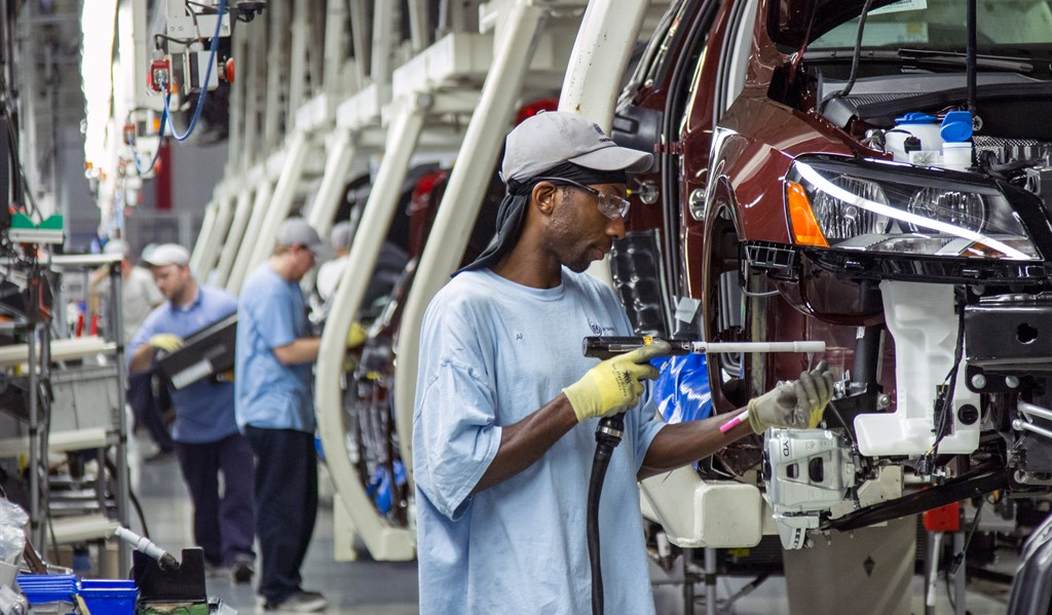The United Auto Workers have determined that going on strike against the Big Three automakers is the best way to extort money from the companies at this time. Beyond that, the UAW wants to test Joe Biden and his claim that he’s “the most pro-union president in history.”
Workers went on strike at three Midwestern plants: a General Motors assembly plant in Wentzville, Missouri, a Stellantis assembly plant in Toledo, Ohio, and part of a Ford plant in Wayne, Michigan. So far, they’re the only plants involved in the strike, meaning that just 9% of the union workforce is walking a picket line.
UAW President Shawn Fain—part clown, part rabble-rouser—wants Biden to eschew the traditional role of a president being neutral in these strikes and choose a side. Fain is fond of making short videos, and in a recording made in the beginning of August, he histrionically threw a contract offer from Stellantis in a wastebasket. Feigning anger, he said, “That’s where it belongs—in the trash—because that’s what it is.”
Fain is not going to let Biden off the hook. The UAW donated $27 million to his 2020 campaign, and Fain now believes it’s payback time—not only for Biden but other Democratic politicians as well.
In an interview on CNBC, Fain said it’s time for “politicians in this country to pick a side.”
Fain says that the automakers “could double our raises and not raise car prices and still make millions of dollars in profits. We’re not the problem. Corporate greed is the problem.”
That’s total nonsense, and the scary part is that he might actually believe it.
“This is our generation’s defining moment,” Fain told UAW members at a Facebook Live event on Thursday night. “The money is there, the cause is righteous, the world is watching.”
The UAW’s demands are flabbergasting. The union is seeking restoration of cost-of-living pay raises given back in The Great Recession of 2008. That’s reasonable and fair. There was also a two-tier wage system created as a result of the recession, where workers with less experience got less money to start. That, too, is a reasonable demand that could be negotiated.
But the union also demands a whopping 46% pay hike over four years and a 32-hour work week with 40 hours of pay. That’s beyond “unreasonable” and would make the U.S. auto industry non-competitive with the rest of the world.
Such significant increases in salaries and benefits would put the Big Three in an extremely uncompetitive position with foreign competitors and Tesla. If the UAW gets everything it wants, workers could earn about $100 an hour in total compensation – roughly twice what their nonunionized counterparts make. Even now, UAW workers make more an hour than the competition.
The negotiations come at a time when the Biden administration, driven by climate change zealotry, is forcing the U.S. auto industry to retool itself quickly for an electric vehicle future through new emissions standards.
UAW leadership has expressed concern about the administration’s aggressive goals and how it could affect members.
The companies are in the midst of the biggest transition in the industry’s history: from internal combustion engines to electric. And the companies are arguing they can’t give the unions what they want and transition to EVs at the same time.
The UAW initially asked for more than 40% raises, as well as the return of pensions, cost of living increases and certain job security provisions. They cited enormous profits by the automakers and the hefty pay earned by the CEOs to make the case for big gains for workers.
That’s not how auto companies see it. They argue that despite high profits, they cannot afford the union’s demands — and that the high cost of the electric transition is a big reason why.
Analysts say the automakers’ stance is not entirely incorrect.
“There is some truth to this,” says Ed Kim, an analyst with AutoPacific. “Yes, they’ve been very profitable, but they’re also, at the same time, very eager to reinvest those profits into their EV product development.”
Indeed, automakers are looking at costs approaching $1 trillion to transition in the 15 years Biden wants them to. Fain and the UAW say they want to go green, but they also want the companies to wet their beaks a little and help them organize the workers at the dozens of electric battery plants springing up across the country.
With a pro-union president in the White House, Fain knows that if an auto strike starts hurting the economy, forcing Biden to intervene, it’s pretty clear which side he will intervene on.










Join the conversation as a VIP Member